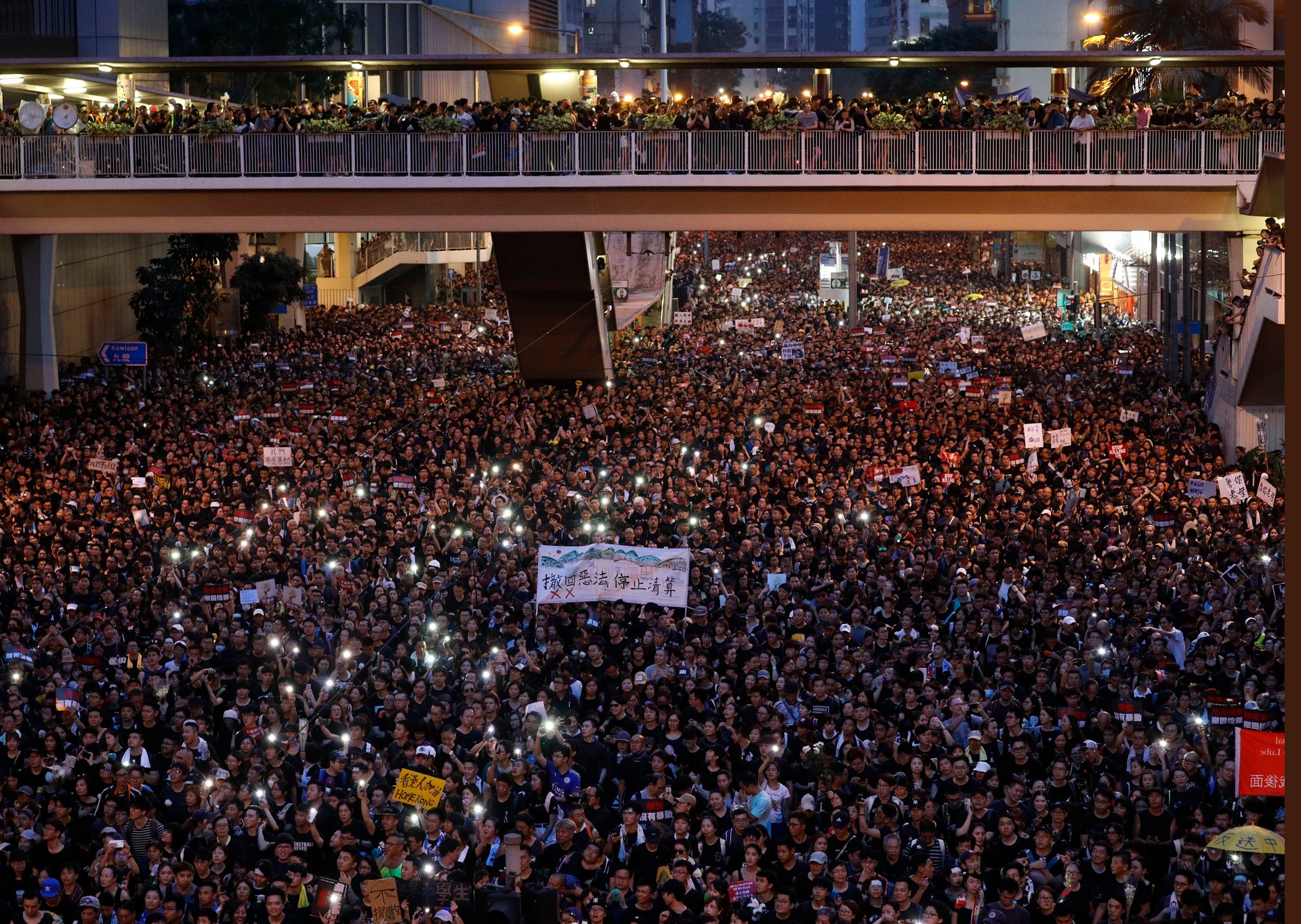Cantonese is Hong Kong protesters’ power tool of satire and identity
Hong Kong’s protesters are furious. They want the complete withdrawal of a hated extradition law. They want their leader to resign. They want the designation of the protests as a “riot” to be withdrawn, and they want proper accountability for what they see as excessive use of force by the police. And they’ve found a creative, viral way to vent their anger: Cantonese wordplay.


Hong Kong’s protesters are furious. They want the complete withdrawal of a hated extradition law. They want their leader to resign. They want the designation of the protests as a “riot” to be withdrawn, and they want proper accountability for what they see as excessive use of force by the police. And they’ve found a creative, viral way to vent their anger: Cantonese wordplay.
In the recent waves of protests that have drawn millions of people to Hong Kong’s streets, and all around the local internet, such wordplay has been key to mobilizing the masses around a set of common goals, taking full advantage of the close rhymes and homonyms that is central to the language. Much of it also showcases the versatility of Cantonese profanity, such as an exchange between a journalist and a police that has spawned uncountable memes based on the insult “your mom.”
Even the very word itself used in Cantonese to mean “anti-extradition to China”—反送中 (faan sung zung)—is multi-layered, at once capturing the gravity of the cause while imbuing it with humor, as explained by Hong Kong-based writer and lawyer Antony Dapiran. The term plays on the multiple homophones for the word zung, which can mean China, an ending, or clock.
Cantonese is the lingua franca of Hong Kong, and language is intimately tied to Hong Kongers’ identity as one that is distinct from the mostly Mandarin-speaking mainland. As China has tightened its grip over Hong Kong in recent years, speaking Mandarin and using simplified Chinese characters—as opposed to the traditional type used in Hong Kong and Taiwan—in the semi-autonomous city has even come to be regarded as taboo by some of the younger generation.
“Since at least 2014, Cantonese is a language of the resistance,” said Lian-Hee Wee, a professor at Hong Kong Baptist University who studies Cantonese phonology. That was the year of Hong Kong’s Umbrella Movement, when protesters occupied major roads throughout the city calling for more democratic elections. During that months-long mass demonstration, people also came up with popular protest slogans that cleverly made use of the qualities of Cantonese.
In addition to its monosyllabic nature and its wide range of tones—nine, to be precise—the language’s position at the nexus of different languages and cultures, perhaps thanks to Hong Kong’s role as a port city, has made it a hotbed for memorable witticisms. Combine clever puns, catchy rhymes, and vivid (and often obscene) imagery with the light-speed of internet culture, and Cantonese becomes a powder keg of viral memes.
“The Cantonese of Hong Kong is the product of contact between English and traditional Cantonese,” said Wee. “And I think it’s that contact over 150 years… that allows people to be so creative in their expression.”
One exchange that has since generated a long list of caustic variations (link in Chinese) involved a riot police officer who was caught on video swearing at a reporter (link in Chinese) who called out “Journalist! I’m a journalist!” during a police clearance operation at one of the protests on June 12.
“Gei nei lou mou (記你老母)!” came the baton-wielding officer’s aggressive response. The phrase roughly translates as “journalist your mom!” The words nei lou mou (“your mom”) are widely-used as an insult in Hong Kong, and stems from diu nei lou mou, which ensures there is no ambiguity by adding diu, the Cantonese equivalent to “fuck.”
Not to be cowed by the police officer’s insult, protesters rallied to the journalist’s cause and came up with all sorts of variants, quickly turning the phrase into a weapon of political satire aimed squarely at the government.
And just as in 2014, when protesters leveraged wordplay to force authorities to eat their words, demonstrators this month similarly seized every opportunity to appropriate officials’ pronouncements and turn them into powerful protest symbols. If the Umbrella Movement protests were defined by the character 傘 (san), meaning umbrella—but also homophonic with the word for disperse—then the fight against the extradition bill may be remembered for a single composite character combining the words 自由 (zi yau), or freedom, and 閪 (hai), a profanity describing female genitalia. The word comes from another insult used by the police against protesters, and was caught on camera (link in Chinese).
Less profane symbols and slogans were also wielded by protesters. Many were seen marching with Pikachu dolls, for example, because the name of Hong Kong’s secretary for security—one of the fiercest proponents of the extradition bill and another key target of protesters’ ire—sounds very much like Pikachu.
Still, there are fears that Cantonese is increasingly being sidelined by Mandarin (though some say those worries are misplaced). Whatever the case may be, mass movements like this month’s anti-extradition protests once again bring Cantonese to the forefront.
“Movements like this have the side effect of revitalizing the language because we suddenly need the language to express the intensity of emotions,” said Wee.